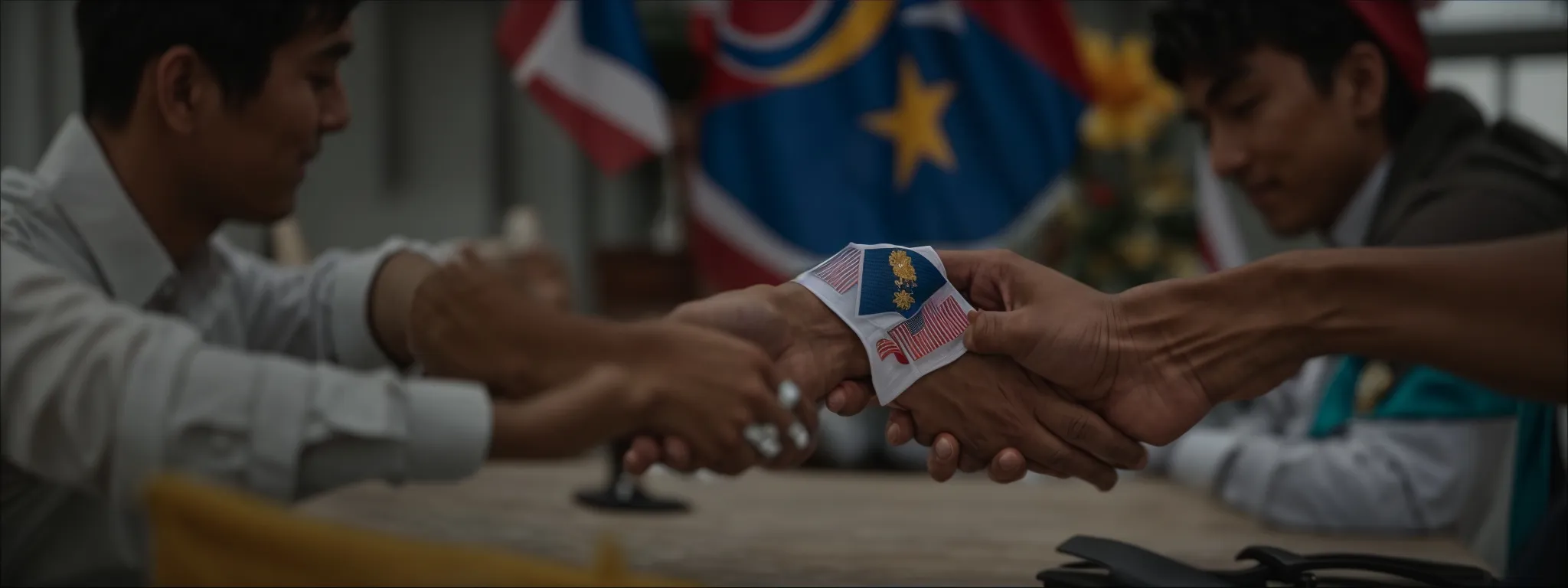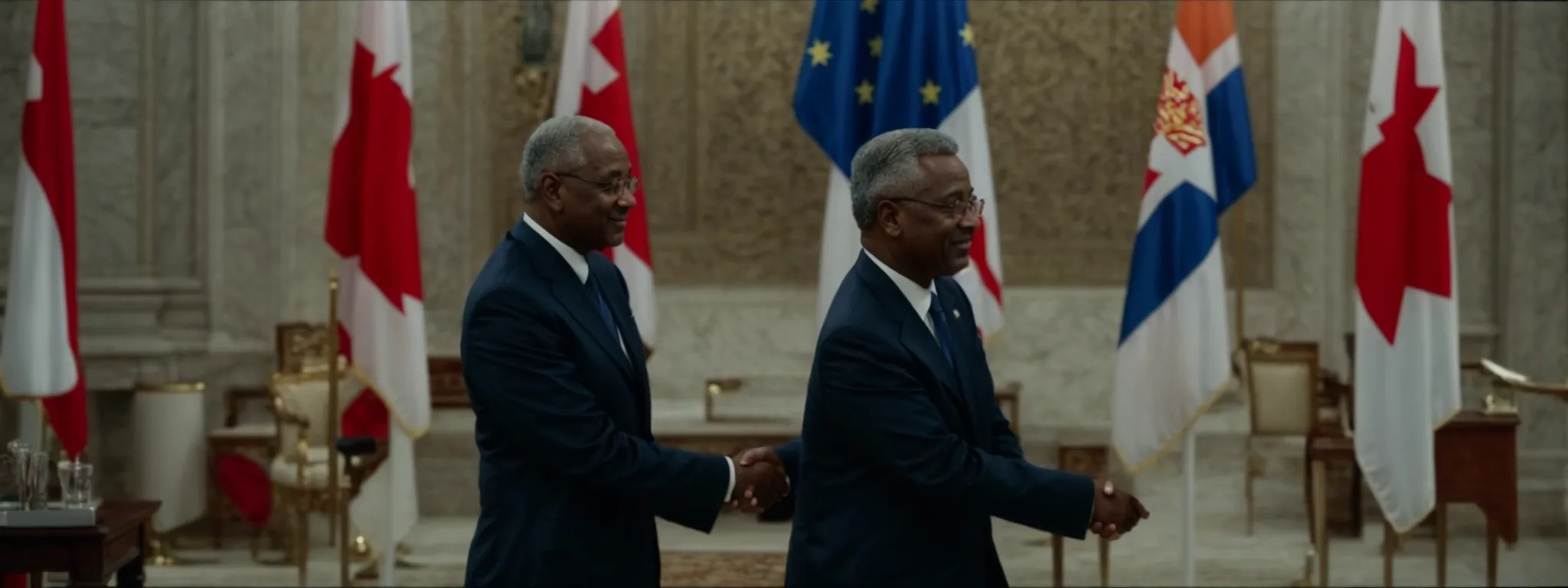Navigating International Trade Disputes: Essential Resolution Mechanisms
In a world where the flow of energy knows no borders, the effective resolution of international trade disputes holds significant sway over global economics.
The Convention on the Recognition and Enforcement of Foreign Arbitral Awards sets a critical precedent, ensuring agreements reached before a tribunal carry weight across jurisdictions.
Yet, when a complaint escalates, navigating the intricate web of dispute settlement in the WTO requires a firm grasp on its procedures and bodies.
From understanding the pivotal role of the Dispute Settlement Body to the nuanced function of the Appellate Body, mastery of these mechanisms is instrumental for businesses and nations alike.
Keep reading to dissect the intricacies of resolving international trade disputes and to glean insights through case studies that illuminate the path to equitable outcomes.
Key Takeaways
- The WTO’s Dispute Resolution Mechanism Is Crucial for Maintaining Global Trade Harmony
- Direct Negotiations and Consultations Are Prioritized for Amicably Resolving Trade Disputes
- Formal Panels and the Appellate Body Ensure Disputes Are Examined With Legal Rigour and Fairness
- Compliance With WTO Rulings Is Essential for Upholding the Rule of Law in International Trade
- The WTO’s Structured Approach Has Been Effective in Resolving Complex Disputes, Such as the Brazil-U.S. Cotton Conflict
Introduction to Dispute Settlement in the WTO

At the heart of the World Trade Organization’s efforts to promote fair and stable trade practices lies its pivotal dispute resolution mechanism.
Laden with a comprehensive suite of dispute resolution services, the WTO stands as a court of sorts for nations at odds over the complexities of international trade laws, including contentious issues surrounding intellectual property and trademarks.
A fundamental understanding of the WTO’s role in managing trade disputes equips member states with the foresight necessary to navigate the tensions that arise from the intricate web of global commerce.
A closer examination of the WTO’s Dispute Settlement Understanding reveals a sophisticated system designed to enforce global trade agreements while fostering amicable resolutions.
Notably, the organization places a strong emphasis on negotiations as a preemptive measure, encouraging members to resolve potential conflicts amicably before invoking the formal procedures that might escalate the dispute.
The multi-faceted approach to managing conflicts over property rights and trade regulations reinforces the institution’s mission to maintain harmony in worldwide markets.
Understanding the Role of the WTO in Trade Disputes
The World Trade Organization (WTO) plays a critical role in mitigating and resolving trade disputes that surface among nations, employing a structured and legalistic framework to address grievances. When conflict ensued between Mexico and another member state over sugar trade regulations, the WTO’s dispute settlement process was pivotal in arduously unraveling the complexities of the case.
Under the WTO’s adjudication protocols, nations such as Mexico with a stake in a dispute typically request the establishment of a panel to delve into the legal intricacies of the matter. This opportunity for a formal hearing and subsequent arbitration is emblematic of the experiences member nations have when they seek redress within the WTO’s jurisdiction:
- A panel is constituted to examine the evidence presented by the disputing parties.
- Legal submissions by the member nations are assessed in accordance with WTO agreements.
- If necessary, a subsequent phase of appeal and arbitration provides further examination and remedy proposals.
Key Features of WTO’s Dispute Settlement Understanding
The Dispute Settlement Understanding (DSU) at the WTO embodies the essence of multilateralism in economics, providing a procedural framework that maintains order and fairness in the resolution of trade disputes. Standing as one of the most active international dispute settlement systems, the DSU delineates the rights and obligations of member states, including those of the European Union, ensuring that economics trumps politics in trade disagreements.
One pivotal function within the DSU framework is the careful scrutiny of subsidies and other contentious measures that could distort trade. Comprehensive documentation, including detailed reports and decisions, are made accessible in PDF format to the public, advancing transparency in the multilateral trade system. The WTO’s structured approach significantly contributes to preventing the escalation of trade disputes:
- Initiation: A member state formally raises a concern regarding specific trade measures of another member.
- Consultations: The parties involved attempt to resolve the matter through direct discussions.
The Importance of Negotiations Before Formal Procedures
In the arena of international disputes, policy management serves as a keystone to averting protracted conflicts, particularly within the framework of the WTO’s dispute settlement process. Before a formal panel convenes, involved parties – including economic powerhouses like Singapore – frequently engage in negotiation sessions that underscore the significance of dialogue in reaching a consensus on contentious trade regulations.
Historically, these preliminary discussions have born fruit, as evidenced by the strides made during the Ministerial Conference, where representatives deliberate on current trade challenges. Such interactions often pave the way for adjustments in policy or regulation, thereby helping to avert the need for a more formalized and adversarial resolution process.
Dispute Settlement Process

The bedrock of managing international commerce disputes hinges on a well-structured, equitable process that accommodates the varying complexities of global trade.
When a grievance arises, initiating a formal complaint marks the first stride towards resolution, commencing with a consultation phase where disputing parties seek common ground.
Should these initial talks falter, the World Trade Organization (WTO) assembles a Dispute Settlement Panel, an innovation in international mediation that mirrors the meticulousness of the International Centre for Settlement of Investment Disputes.
Lawyers proficient in international trade law take the helm, dissecting the intricate layers of copyright and trade disputes.
The panel’s rigorous examination culminates in a comprehensive report, laying the foundation for member states to deliberate and approve the findings.
As the embodiment of fair practice within the international sphere, this process ensures that member states embrace and adopt the reports, thereby affirming the integrity of the WTO’s conflict resolution system.
Filing a Complaint and Consultation Phase
When tensions escalate over trade practices, initiating a complaint within the World Trade Organization’s framework marks the primary recourse for nations seeking redress. The first crucial phase, per international arbitration norms, requires the aggrieved party to formally address their grievances regarding a perceived breach of a free trade agreement, thus setting the stage for resolution.
In this initial stage, direct consultations between the disputing nations aim to resolve the conflict without resorting to further litigation, underscoring the WTO’s preference for diplomatic dialogue over contentious debate. These talks represent a good faith effort to preserve the principles of free trade and mitigate disputes before they necessitate intervention by a formal panel or judicial entity.
Formation of the Dispute Settlement Panel
In the charged atmosphere of a dispute, the establishment of a Dispute Settlement Panel by the World Trade Organization introduces a legal bedrock informed by international trade law. This panel, often comprising experts from varied jurisdictions including Hong Kong, is tasked with providing an unbiased examination of the arguments, grounded in solid legal principles, ensuring that the essence of the underlying contract remains central to the resolution.
Should the consultations fail to yield an agreement, the involved parties proceed to this critical phase, seeking an objective resolution through the meticulously formed panel. During this juncture, the adjudicators, well-versed in the subtleties of law, diligently parse through the complexities of the lawsuit, offering both parties a fair platform to present their case in the shadow of international legal precedent.
Panel Examination and Issuing of Report
Once the WTO’s Dispute Settlement Panel is in session, a meticulous exploration into the claims and evidence commences. The panel’s function is to provide an objective analysis, particularly in complex cases where accusations such as dumping by Asian markets into foreign territories have raised concerns.
The issuance of the panel’s report is a decisive moment in the dispute settlement process. Not only does it contain detailed findings, but it also includes any recommended actions, ensuring that these adhere to the arbitration clause in the relevant agreements and uphold the principles of diplomacy and risk mitigation.
Approving and Adopting Panel Reports
Attaining the requisite regulatory compliance in the aftermath of a dispute settlement trial relies heavily on the firm endorsement of the Panel’s comprehensive report. Once presented, such reports demand approval from the WTO’s broader membership, a step that cements the resolution within the realm of international law and aligns with established foreign policy protocols.
After assenting to the Panel’s conclusions, enacting necessary adjustments, which can include imposing countervailing duties or modifying investment guidelines, becomes critical. This process not only reinforces the fairness of the settlement but also ensures that the involved parties adhere to the Panel’s guidance with the earnest intent of rectifying trade inconsistencies.
The Role of the Dispute Settlement Body

The Dispute Settlement Body (DSB) functions as the judge and overseer within the World Trade Organization’s framework, vigilantly monitoring the implementation of rulings and recommendations ensuing from trade disagreements.
It offers an alternative dispute resolution arena that serves as a beacon for member nations, including Indonesia, providing essential forums for arbitration and appeals against the backdrop of stubborn trade standoffs.
International law firms often scrutinize the DSB’s procedures, observing how this mechanism preserves the delicate balance of global trade by enforcing rulings, managing tariffs, and authorizing retaliation to ensure compliance with international trade agreements.
Through its critical role, the DSB upholds the resolution of trade disputes while fostering respect for mutual agreements among member states.
Monitoring Implementation of Rulings and Recommendations
Ensuring that World Trade Organization (WTO) rulings and recommendations are implemented with fidelity is essential to maintaining the integrity of the rule of law within international trade. The Dispute Settlement Body (DSB) investigates compliance, examining whether member states have adjusted their policies and practices in accordance with the panel’s findings to support positive market outcomes and stable supply chains.
The sovereignty of each WTO member is respected in the enforcement process, yet research underscores the necessity of harmonious adherence to arbitrated decisions. This dynamic reinforces the collaborative pursuit of equitable trade, while ensuring that the global framework of commerce and supply chain networks remains robust and responsive to the findings of authoritative dispute resolutions.
Providing a Forum for Arbitration and Appeals
The Dispute Settlement Body of the World Trade Organization provides a crucial forum where nations, including Canada, can seek impartial arbitration and appeal a panel’s judgment. This stage is fundamental for countries to ensure that the nuances of issues like privacy in trade are adequately addressed and that every voice is heard in the final outcome.
Within this arena, appeal proceedings offer an additional layer of scrutiny to the initial verdict, critical to safeguarding the interests of nations concerned about the potential impact on import policies. It is this provision that ensures the decisions reached are not only judicious but also equitable, reflecting the collective commitment to fair trade practices.
Ensuring Compliance and Authorization for Retaliation
The Dispute Settlement Body (DSB) serves as the critical arm of the World Trade Organization charged with enforcing adherence to resolved trade agreements. When nations defy the terms of a settlement, the DSB is empowered to authorize proportionate retaliation measures, which may include tariff adjustments on goods, thus ensuring that commerce adheres to the mutually agreed norms.
In responding to instances where a member country fails to align its practices with the rulings of a settlement, the DSB upholds the sanctity of trade agreements by granting the affected party the right to impose sanctions. This decisive action safeguards the interests of aggrieved parties and reinforces the principle that resolutions derived through the WTO’s structured process must be respected in both letter and spirit.
Exploring the Functioning of the Appellate Body

The Appellate Body operates as a vital cog in the wheel of dispute resolution, serving to refine and sometimes overturn decisions made by WTO panels.
Engaging the appeal process demonstrates a commitment to meticulous oversight in the administration of international trade justice.
Renowned law firms, including those from India and the Middle East, often analyse past Appellate Body decisions, gleaning insights into evolving jurisprudence that influence future disputes.
The impact of these high-profile cases ripples across trade laws worldwide, altering the landscape of commerce and setting precedents that shape the interactions between sovereign economies.
Thus, grasping the Appellate Body’s influence is imperative for those navigating the intricate realm of international trade conflicts.
Understanding the Appeal Process
At the core of the WTO’s system to resolve international trade disputes is the Appellate Body, entrusted with the power to review the legal aspects of reports issued by panels under the Dispute Settlement Body. This meticulous scrutiny enables the refinement of the initial findings, ensuring decisions are grounded in the framework of the General Agreement on Tariffs and Trade and other relevant WTO agreements.
The appeal process is a pivotal phase in the dispute resolution continuum, as it provides member countries with the opportunity to challenge panel reports before they are adopted by the Dispute Settlement Body. This not only underscores the WTO’s dedication to economic fairness but it also reinforces the Appellate Body’s role as a guardian of legal precision in international commerce:
- Review of Panel Reports: The Appellate Body examines legal interpretations and the application of agreements in the disputed panel report.
- Member States’ Right of Appeal: Following a review, member states can voice objections and seek rectifications, safeguarding their economic interests within the global trade framework.
Analysis of Previous Appellate Body Decisions
An analysis of prior decisions by the World Trade Organization’s Appellate Body unveils the evolving landscape of international trade law, offering a particular lens through which current members like Vietnam can interpret the organization’s code of conduct. Lessons drawn from these historical verdicts provide a matrix of legal reasoning that guides members in formulating tax policies and trade strategies that align with WTO regulations.
The significance of the Appellate Body’s role within the World Trade Organization becomes especially apparent when scrutinizing the outcomes of high-stakes cases that have influenced global trade relations. Through rigorous examination of legal arguments, the Appellate Body establishes precedents that serve to clarify ambiguities in tax and trade law, creating a benchmark for the organization’s members to measure their domestic policies against universally recognized standards.
Impact of Decisions on International Trade Laws
The Appellate Body’s decisions often reverberate through the intricate frameworks of treaties such as the North American Free Trade Agreement, influencing the boundaries and nuances of regional cooperation. As precedence clarifies the interpretation of complex agreements, it fosters an environment conducive to the free exchange of information, and adjudicating on a basis that reinforces mutual trade relations.
Moreover, the judgments issued by the Appellate Body have been instrumental in shaping the legal landscape surrounding mergers and acquisitions, ensuring that such business activities align with international trade laws. Their rulings provide a blueprint that adheres to the underlying principles of worldwide treaties, reinforcing the legal structure within which international corporations operate.
Negotiations to Improve Dispute Settlement Procedures

In an era marked by the rapid pace of globalization, the mechanisms for resolving international trade disputes have become more crucial than ever.
Participants in the global market, from exporters navigating customs regulations to multinational corporations hammering out trade deals, rely on an evolving framework that facilitates smooth negotiation and dispute resolution.
Recent developments within these mechanisms are reflecting the shifting dynamics of international trade, prompting a slew of key proposals aimed at overhauling dispute settlement procedures.
These suggestions, if implemented, hold the potential to significantly alter the landscape of global commerce.
As the World Trade Organization (WTO) contemplates the future of its dispute settlement system, the trading community watches with keen interest to understand how these changes might impact the delicate balance of international trade relations.
Recent Developments in Dispute Resolution Mechanisms
In an effort to streamline the resolution of trade disputes, recent advancements have emphasized the role of mediation as a primary tool. Such developments are designed to enhance logistics and communication between conflicting parties, aiming to resolve disputes rapidly and efficiently, directly impacting the economy by minimizing disruptions in the flow of goods and services.
Growing calls for increased transparency within resolution processes have led to reforms that demand clearer guidelines and more open communication channels. These enhancements serve to bolster economic relations by ensuring all parties are well-informed and the rationale behind decisions is made public, fostering trust and understanding in the international economy.
Key Proposals and Their Potential Impacts on Global Trade
The International Chamber of Commerce has emerged as a crucial advocate for refining global trade dispute resolution, suggesting enhancements that could streamline procedures for timely and equitable settlements. A focus on these proposals, particularly relevant in the context of trade disputes with China, acknowledges the need for an agile and responsive system capable of adapting to the rapid changes in the global trade arena.
As global commerce intensifies, particularly with China’s substantial role in international markets, the impact of proposed adjustments to dispute settlement mechanisms by the International Chamber of Commerce could be profound. Improved efficiency and fairness in these procedures aim to reduce trade frictions and foster a more dynamic and harmonious international trade environment.
The Future of Dispute Settlement in the WTO
The exigency for modernizing dispute settlement within the WTO is clear as member nations look for methods to address the challenges of a rapidly altering global trade panorama. Enhanced dispute resolution strategies will be essential to surmount obstacles erected by novel trade barriers and the evolution of digital markets, necessitating a fluid framework that can endure the test of change and maintain international trade coherence.
With ongoing discussions aimed at reforming the WTO’s dispute settlement capabilities, the future portends the advent of a more streamlined and effective system. The goals include diminishing procedural delays and affording greater resolution flexibility, thus upholding the WTO’s pivotal role in fostering a fair and disciplined global trade regime amidst the continuously shifting sands of international commerce.
Case Studies: Resolving International Trade Disputes

The landscape of international trade is frequently marked by disputes that challenge the relations between nations and impact global commerce.
Through the prism of selected case studies, stakeholders can gain deep-rooted insights into the intricate process of dispute resolution.
Examining instances where careful negotiation and strategic diplomacy have successfully resolved conflicts serves not only as an instructive guide but also provides benchmarks for future proceedings.
By recounting instances of complex trade disputes and highlighting key strategies that led to resolution, this section will elucidate the pivotal factors that contribute to the crafting of solutions acceptable to all parties involved, thereby strengthening the fabric of international trade.
Analyzing Successful Dispute Resolution Examples
An analysis of successful trade dispute resolutions reveals the effectiveness of the WTO’s structured approach in fostering an equitable trading environment. The Brazil-United States cotton dispute, for instance, exemplifies the dispute settlement process’ ability to handle complex cases, with the resultant measures influencing global agricultural policies and subsidies.
- After a prolonged litigation process, Brazil and the United States reached an agreement, finding common ground on subsidies and support for Brazilian cotton producers.
- The resolution of this dispute underscored the WTO’s role in facilitating negotiations that balance economic interests and legal obligations, setting a precedent for future agriculture-related disputes.
Another instructive example is the resolution of the banana trade conflict between the European Union and several Latin American countries, along with the United States. The dispute’s resolution, achieved through the WTO mechanisms, transformed international fruit trade regulations and showcased the institution’s capacity to reconcile contentious tariff issues and trade preferences within the context of historical agreements.
- The panel’s conclusions provided a foundation for reforming the EU’s banana import policies, aligning them with WTO rules and promoting a more liberalized trade environment.
Lessons Learned From Complex Trade Dispute Cases
The protracted litigation between the United States and the European communities over steel products distilled valuable lessons regarding the adaptability and resilience of the international trade framework. This dispute illuminated the necessity for meticulous interpretation of fair trade practices and adjustment measures imposed on raw materials and commodities that sit at the core of industrial economies.
- It demonstrated the World Trade Organization’s capacity for diffusing tension through its structured mechanisms, leading to a reevaluation of tariffs and the realignment of policies with global trade norms.
- The case also highlighted the importance of timely compliance, as protracted disagreements can lead to sustained economic impact, reverberating through domestic industries and international relationships.
Affirming its role as an arbiter, the WTO’s handling of the complex semiconductor dispute between Japan and South Korea underscored the importance of technology transfer clauses and respect for intellectual property rights. The resolution of this dispute reaffirmed that intellectual property rights protection plays a critical part in encouraging innovation and maintaining the integrity of global trade agreements.
How Effective Negotiation Strategies Led to Mutually Acceptable Solutions
Strategic negotiation, in its essence, is the art of finding common interests and constructing solutions that align with the needs of conflicting parties. The resolution of the longstanding banana dispute between the European Union and Latin countries is a testament to the effective use of these strategies, wherein diplomacy and mutual concessions paved the way for a harmonious outcome that settled tariff imbalances and trade preferences:
Echoing this sentiment, the complex legal wrangling seen in the Brazil-United States cotton dispute showcases how strategic negotiations can resolve even the most deeply entrenched trade differences. The resolution, favoring both parties, emerged through a relentless pursuit of compromise, resulting in subsided tensions and a mutually beneficial agreement on agricultural policy and subsidies.
The WTO's Dispute Resolution Mechanism
Navigating international trade disputes requires an intricate understanding of resolution mechanisms within the World Trade Organization framework to ensure fair and stable market practices.
The WTO’s Dispute Settlement Understanding and the role of the Appellate Body are central to upholding the principles of free trade and providing a platform for impartial arbitration.
Through strategic negotiation and adherence to established processes, member states can find mutually acceptable solutions that align with global trade norms.
Effective resolution of these disputes is pivotal for maintaining harmony in international commerce and fostering sustained economic relationships between nations.


